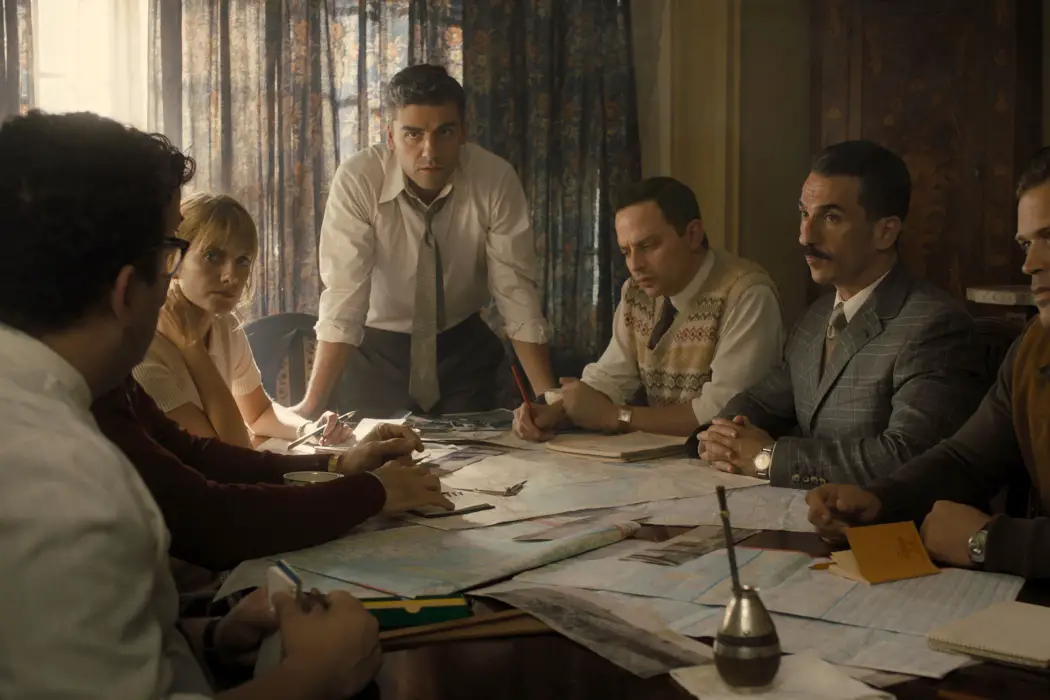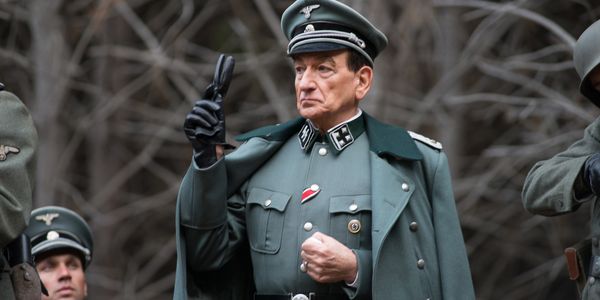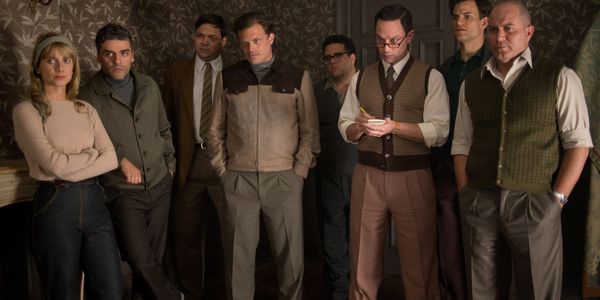OPERATION FINALE: Revenge & Justice Clash In Somber True Story

I'm a student at the University of North Carolina at…
In depicting the capture of infamous Nazi Adolf Eichmann, Chris Weitz‘s Operation Finale promises a complex battle between Oscar Isaac and Ben Kingsley (read our interview with Kingsley here), the kind of mental tug of war that will leave viewers shaken. At its core, this post-World War II thriller examines the subjective and abstract nature of revenge and justice in the wake of unimaginable tragedy on an unfathomable scale. And above all else, it’s a deeply personal story for a man who lost a piece of himself in the Holocaust.
Operation Finale is also a spy thriller. And while that may seem to work in its advantage, the tropes of the genre end up being rather harmful in this instance. Sure, the action-driven elements are more than serviceable, even generating a good bit of excitement at times. Still, one can’t escape the thought that there might be a deeper, more emotionally and psychologically penetrating version of this film out there, a version that simply never came together in the editing room.
In its current state, Operation Finale feels restrained and restricted, unable to deliver in a tonally consistent and satisfying fashion.
The Search For A Killer
After World War II, a number of high-ranking Nazis fled Germany and headed to Argentina, fleeing justice at Nuremberg in the process. Chief among the Nazis in hiding in Buenos Aires is Adolph Eichmann (Kingsley), the man responsible for designing and executing Hitler’s “Final Solution.” Led by Agent Peter Malkin (Isaac), the Israeli government searches for Eichmann for years, even inadvertently killing an anonymous Nazi officer in the hunt for this figure of great evil.

In 1960, the Mossad agents tasked with Eichmann’s case find a new lead, mostly thanks to the work of Sylvia Hermann (Haley Lu Richardson), a young Jewish girl living in Buenos Aires. Sylvia strikes up a relationship with Klaus Eichmann (Joe Alwyn), whose “uncle” is later revealed to be the man at the top of Israel’s most wanted list. With Eichmann’s presence confirmed, Peter begins assembling a team, including ex-girlfriend Hanna (Melanie Laurent) and close friend Rafi (Nick Kroll). The goal is simply to catch the notorious killer and bring him back to Israel, where he will stand trial for his crimes.
Peter and his fellow agents easily capture Eichmann, transporting him to a safe house where he can go undetected. But that’s only the beginning. In order to get such a powerful figure out of the country, this team will have to undergo a complex and potentially life-threatening bureaucratic process, fighting legislative guidelines, suspicious Argentinian agents, and Eichmann’s own manipulative personality in order to pull off the extradition. It turns into an elaborate game of mental chess between Peter and Eichmann, a battle to see who can crack under the pressure first.
Vengeance In The Age Of Diplomacy
Much can be said about this film, but there’s never any doubt that Operation Finale has significant questions worth asking. It’s the rare World War II-centered story to take place years after those traumatic events, examining how anger and anguish have manifested in different ways. Director Weitz and screenwriter Matthew Orton want to push our buttons, both in their depiction of a killer who has rationalized his behavior and said killer’s sickening attempts at infuriating his captors.

This friction between the thirst for revenge and the necessity of law-abiding process arises in a number of sequences, including many between the film’s two stars. Oscar Isaac and Ben Kingsley are fairly good here, but their best moments come when they play into a level of behavioral ambiguity. Is Eichmann truly sorry for the crimes he committed during the Holocaust? Is Peter really buying Eichmann’s act? Why is a Jewish man who lost so much developing such a close relationship with the monster who took everything from him?
As two of the best actors working today, Isaac and Kingsley make this uncertainty work. Some of their scenes together are repetitive and dull, but there’s a dynamic in play that clicks. Yet, even as the stars of the show, our leads feel underutilized, often pushed to the wayside in favor of the next plot development. The draw of Operation Finale should be seeing this unpredictable, occasionally terrifying interplay between an Israeli agent and an aging Nazi, but the film doesn’t seem to realize that. Even the best of the sequences between Malkin and Eichmann feel contained, falling shy of astute psychological analysis.
A Film Held Back By Genre Conventions
This is where that tonal collision becomes an increasingly apparent issue, one that the film never fully recovers from. On their own, each mood in Operation Finale is efficient and engaging. The mental duel between Isaac and Kingsley proves to be occasionally insightful, while the spy thriller elements are often as taut and tense as expected. Put them together, and well, things get a little trickier.

By no means is this a breezy or fun spy tale, but the surrounding sequences are so disturbing and mournful that espionage feels trivial in the face of overwhelming emotional scars. It’s always obvious when the film is switching gears, as Alexandre Desplat‘s energetic score will vanish and the mood of solemnity will re-surface, guaranteeing a certain level of contemplation in the following scene. Operation Finale is pensive and provocative, but it also feels a desire to thrill viewers. Maybe that’s a demand of mainstream filmmaking, or maybe the film simply lacks confidence in its audience.
To be fair to the viewer, there’s a lot in this film that doesn’t work on a surface level either. For one, there are too many characters, way more than Weitz and Orton are equipped to handle. The film places itself as something of an ensemble picture, a heist movie where the target is a person instead of money. Except few of the characters have distinct personalities, and those who do often fade to the background as the story progresses. To use a prime example, there’s a fascinating, troubling relationship between Haley Lu Richardson and Joe Alwyn in the first act, only for the film to mostly abandon them as things progress. Why? I couldn’t say.
Operation Finale: Conclusion
Much of the film is also a touch too sluggish, dragging its feet when it should be dabbling in something more introspective. It’s frustrating that Operation Finale remains limited by its adherence to the spy genre, destined to continually fall short of its lofty potential.
It’s a handsome and sporadically captivating exercise, but the obvious possibility of something much more challenging and exhilarating leaves the thriller in a rocky position.
Did you enjoy Operation Finale? Are you a fan of Oscar Isaac and Ben Kingsley? Let us know in the comments below!
Operation Finale was released on August 29 in the U.S. For full international release information, click here.
Does content like this matter to you?
Become a Member and support film journalism. Unlock access to all of Film Inquiry`s great articles. Join a community of like-minded readers who are passionate about cinema - get access to our private members Network, give back to independent filmmakers, and more.
I'm a student at the University of North Carolina at Chapel Hill. For 8 years, I've edited the blog Martin on Movies. This is where I review new releases, cover new trailers, and discuss important news in the entertainment industry. Some of my favorite movies- Casablanca, Inception, Singin' in the Rain, 2001: A Space Odyssey, The Wolf of Wall Street, The Nice Guys, La La Land, Airplane!, Skyfall, Raiders of the Lost Ark. You can find my other reviews and articles at Martin on Movies (http://martinonmovies.blogspot.com/).













